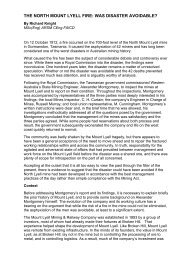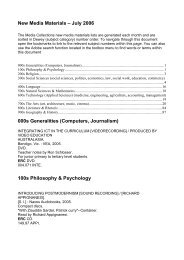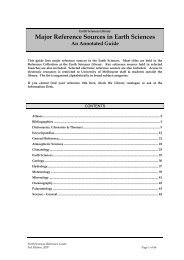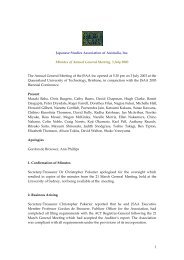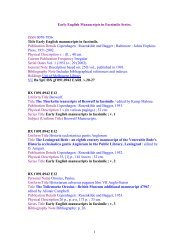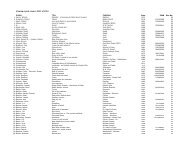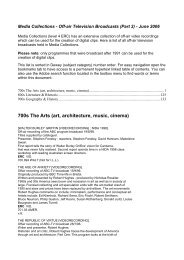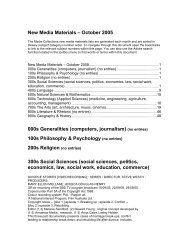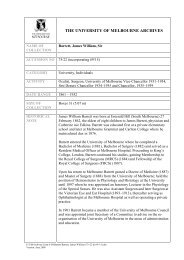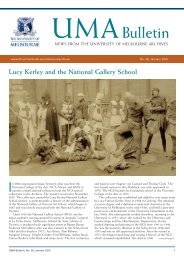Media Collections - Off-air Television Broadcasts (Part 1) - Library ...
Media Collections - Off-air Television Broadcasts (Part 1) - Library ...
Media Collections - Off-air Television Broadcasts (Part 1) - Library ...
Create successful ePaper yourself
Turn your PDF publications into a flip-book with our unique Google optimized e-Paper software.
Correspondent, Peter J. Boyer.<br />
With adult movies and magazines, retail store sales and the growth of the<br />
Internet, pornography is one of the hottest industries in America. This<br />
investigative report examines the forces behind the recent explosion of sexually<br />
explicit material available in American society and the pending political battle<br />
that may engulf the multi-billion dollar pornography industry.<br />
ERC VID.<br />
338.47364 AMER.<br />
DYING FOR DRUGS [VIDEORECORDING] / DIRECTORS, BRIAN WOODS, MICHAEL SIMKIN ;<br />
PRODUCER, BRIAN WOODS.<br />
<strong>Off</strong>-<strong>air</strong> recording of the SBS programme broadcast 05/04/05. Copied under <strong>Part</strong> 5A<br />
of the Copyright Act 1968.<br />
Colour recording system: PAL ; Region all.<br />
Closed captioned for the hearing-imp<strong>air</strong>ed.<br />
Copyright notice: Commonwealth of Australia. Copyright Regulations. 1969.<br />
Warning.<br />
Researcher, Deborah Shipley; editors, Reg Clarke, Jeremy Wales, Brian Edwards.<br />
Reporter, Brian Woods.<br />
This film investigates, firstly, into how drugs companies resort to expediency<br />
to get their drugs approved quickly, side-stepping the Nuremberg codified rules<br />
on human experimentations in medicine. Secondly, into how they use their<br />
monopoly on supply to get the prices they want, earning billions. Footage of two<br />
cases of unethical drugs testing on humans; and two cases of excessive pricing.<br />
Case one involves Pfizer Inc.'s testing of a new meningitis drug on children in<br />
1996, in Kano, Nigeria, far away from scrutiny. Case two involves Dr. Nancy<br />
Olivieri and Apotex Inc. in their international trials with thalassemia major<br />
patients, beginning in Toronto. Apotex curtails the study, determined to market<br />
the new drug, L1, quickly; and fires trial ch<strong>air</strong>person, Dr. Olivieri, gagging<br />
and intimidating her. In Korea, the overpricing of the leukemia drug, Glivec, by<br />
Novartis places it beyond the reach of patients. While in Central America, the<br />
excessive pricing of anti-retroviral medicines, by Pfizer, is forcing people to<br />
illegally smuggle vastly cheaper generic drugs to try to save lives. Indian<br />
drugs companies, like Cipla, make generic versions of drugs, selling them at a<br />
fraction of the price charged by pharmaceutical giants. But, once the new W.T.O<br />
agreement comes into effect, in 2006, India must provide full patent protection,<br />
thereby threatening a generic drugs industry which supplies much of the world's<br />
cheap drugs. With real competition gone, the powerful pharmaceutical industries<br />
will be able to charge anything. The world could end up with a few big 'pharmas',<br />
with the undesirable monolithic overuse of power to push pills, and life or<br />
death. Interviews with international experts who analyse and appraise the cases<br />
presented.<br />
First released: [Australia : SBS-TV, c2005?] Original released in series: Hoc<br />
docs.<br />
DVD.<br />
Report in English; dialogues in various languages with English subtitles.<br />
ERC DVD.<br />
338.47615 DYIN.<br />
POWER TRIP [VIDEORECORDING] / DIRECTED, EDITED & PRODUCED BY PAUL DEVLIN.<br />
<strong>Off</strong>-<strong>air</strong> recording of the SBS-TV program broadcast 24/2/04. Copied under <strong>Part</strong> 5A<br />
of the Copyright Act 1968.<br />
AES, the massive American global power company, has purchased Telasi, the ailing<br />
electricity distribution company in Tbilisi, capital of the former Soviet<br />
Republic of Georgia. Under Soviet communism, the government paid for electricity<br />
or the cost was negligible. Local AES manager Piers Lewis must now train the<br />
entire population that in the new market economy, customers have to pay for<br />
their electricity. The Georgians meanwhile, from meter readers to the Energy<br />
Minister, devise ever more clever ways to get it free.<br />
Some English subtitles.



